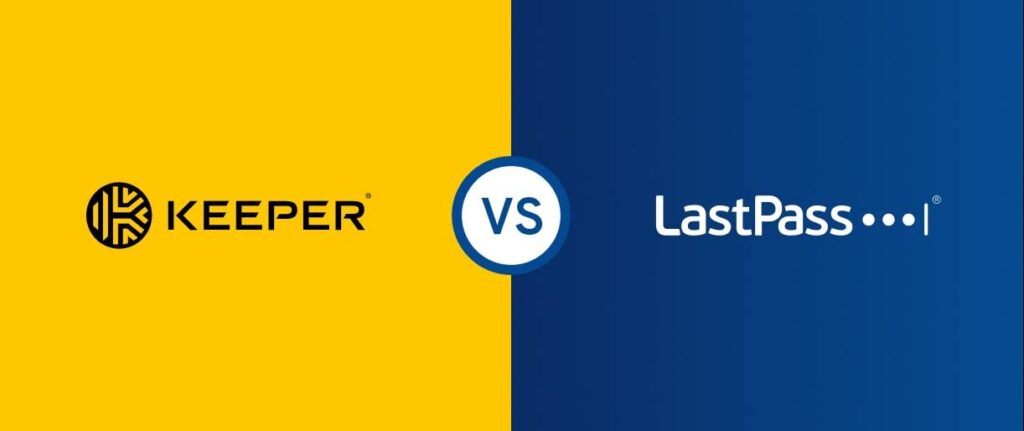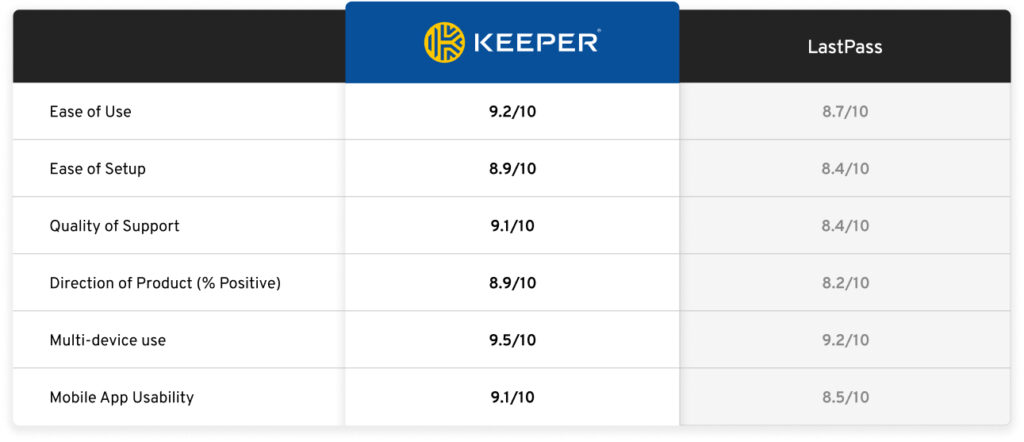An authenticator app is a method of Multi-Factor Authentication (MFA) that adds an extra layer of security to your online accounts. Keeper® can be used in
Updated on May 23, 2023.
The main difference between Keeper and LastPass lies in their approaches to security. Keeper uses a zero-knowledge security model and encrypts data at the device and record level, while LastPass only encrypts data at the vault level making it more vulnerable to cyber attacks. Furthermore, Keeper offers a range of plans with more comprehensive security features compared to LastPass, providing users with a wider array of options to cater to their specific needs.
What Is Keeper Security?
Keeper is a zero-knowledge security and encryption provider that offers password management, secrets management, connection management, privileged access management and other cybersecurity solutions to protect every user within an organization on every type of device. Keeper’s solutions deploy in minutes and seamlessly integrate with any tech stack to prevent breaches, reduce help desk costs and ensure compliance.
Keeper offers both a consumer and business password manager that allows users to store online login credentials, documents, media files and other private information in an encrypted digital vault. Once Keeper is set up, the only password users have to remember is the master password they use to enter their digital vault.
Along with a password manager, Keeper also has a secrets manager and connection manager. All three form a unified Privileged Access Management (PAM) solution.
Keeper also offers secure add-ons such as dark web monitoring, secure file storage and more. It rates highly across multiple password software review sites as a reliable and secure way to protect businesses of all sizes and in all industries. Millions of users around the world trust Keeper to secure their passwords and other sensitive data.
What Is LastPass?
LastPass is a subscription-based password manager that allows users to store passwords in a digital vault. LastPass is a freemium service that offers a free basic package for individuals and a premium package for families and businesses.
LastPass is a popular password management solution, but how does it stack up against Keeper?
LastPass vs Keeper: Password Manager Features Comparison
Plans and Pricing
Price is a key variable to consider when choosing a password manager. Keeper and LastPass offer competitive pricing for single users, families, small-to-medium-sized businesses and enterprises.
Additionally, Keeper offers discounted rates for students, healthcare workers and members of the military. LastPass occasionally offers limited-time deals for education users but does not offer ongoing discounts. Both platforms offer add-on services at an additional cost.
Data Protection and Security
Keeper is fanatical about customer data protection. Keeper has the longest-standing SOC 2 and ISO 27001 certifications in the industry. That means that Keeper has continuously demonstrated compliance with 114 information security controls and has implemented an Information Security Management System (ISMS) that meets the internationally recognized ISO standard.
Keeper’s zero-trust framework and zero-knowledge security architecture protect users’ data and Personally Identifiable Information (PII) with several layers of encryption keys. Keeper has gone through a rigorous process to become FedRAMP and StateRAMP Authorized, which means our solutions have been reviewed by the government and authorized for use by federal agencies and state governments.
In comparison, LastPass’ architecture only supports encryption at the vault level – making user information more vulnerable to cyber attacks. Most recently, LastPass revealed that cybercriminals stole customer vault data during an incident that occurred in August 2022. LastPass isn’t new to breaches, in 2015 LastPass suffered an attack that exposed its users’ email addresses and security information. LastPass is also not FedRAMP or StateRAMP Authorized.
Flexible and Seamless SSO Integration
Single Sign-On (SSO) reduces password fatigue, minimizes help desk tickets for lost passwords and enhances efficiency, but when used alone, it leaves organizations with significant security gaps.
Keeper SSO Connect® is a 100% cloud-based SAML 2.0 service designed to eliminate SSO security gaps. It seamlessly and quickly integrates with your existing SSO or passwordless solution – enhancing and extending it with zero-knowledge password management and encryption.
Keeper SSO Connect is compatible with all popular SSO Identity Provider (IdP) platforms including Office365, Azure, ADFS, Okta, Ping, JumpCloud, Centrify, OneLogin and F5 BIG-IP APM. Keeper SSO Connect® Cloud also integrates with all popular passwordless platforms, including Duo, HYPR, Trusona, Octopus, Traitware, Veridium and many more.
By simply authenticating through their organizations’ existing IdP, employees gain access to the Keeper password management platform and all its capabilities, including:
- A secure digital vault that’s accessible on virtually any device, running any OS.
- Automatically generated passwords and autofill capabilities on all devices.
- Desktop and mobile apps, plus browser extensions for all major web browsers.
- Proprietary zero-knowledge encryption.
Customer Support
On average, customers have rated Keeper positively on a five-point rating system. Keeper meets or exceeds in comparison to LastPass across several top review websites:
| Review Site | Keeper | LastPass |
|---|---|---|
| TrustPilot | 3.8/5 (2,860 Reviews) | 1.4/5 (530 reviews) |
| Gartner Reviews | 4.7/5 (69 ratings) | 4.2/5 (179 ratings) |
| Google Play | 4.6/5 (100k reviews) | 3.8/5 (226k reviews) |
| App Store | 4.9/5 (158.8k ratings) | 4.5/5 (50.6k ratings) |
*Ratings and reviews as of May 22, 2023.
In G2’s comparison of the Keeper and LastPass password managers, Keeper achieved higher customer satisfaction ratings in all categories, including:
- Ease of use
- Ease of setup
- Quality of support
- Direction of product (% positive)
- Multi-device use
- Mobile app usability
Interested to see how Keeper and LastPass compete in all areas? Go to G2 to see the full comparison.
LastPass vs Keeper: Privileged Access Management Comparison
Secrets Management
Businesses need to protect more than their employees’ passwords. Keeper Secrets Manager (KSM) is a cloud-based, zero-knowledge platform for securing IT infrastructure secrets such as API keys, database passwords, access keys, certificates and other privileged credentials.
As of this writing, LastPass does not offer a secrets manager.
Connection Management
Businesses also need to secure their remote connections. Keeper Connection Manager (KCM) is an agentless and clientless remote desktop gateway that is easy to implement. KCM enables organizations to adopt zero-trust remote access and offers features such as Role-Based Access Control (RBAC), Multi-Factor Authentication (MFA) and least privilege access.
As of this writing, LastPass does not offer a connection manager.
Privileged Access Management
KeeperPAM combines Keeper’s Enterprise Password Manager, Keeper Secrets Manager and Keeper Connection Manager into one unified platform so businesses can protect their privileged passwords, secrets and connections without the complexity of legacy PAM solutions.
As of this writing, LastPass doesn’t offer a PAM solution
Switching to Keeper Has Never Been Easier
Switching to Keeper takes less than one minute. Keeper includes a LastPass import wizard that seamlessly imports your LastPass records into your Keeper vault, on all of your devices.
Keeper protects millions of individuals and thousands of organizations globally from password-related data breaches and cyber threats. With a variety of packages and add-ons, organizations of all sizes and in all industries can find a suitable solution.
Get in touch with a member of the team to request a demo and switch to Keeper.
Frequently Asked Questions
Is LastPass safe to use?
No, LastPass is not entirely safe to use. Given LastPass’ history with breaches, it’s best to rely on safer options to store your passwords and other sensitive information.
Has LastPass ever been hacked?
LastPass was hacked in 2015, leading the company to make changes to strengthen its systems. Additionally, there was another incident in 2021 where multiple users received a notification claiming attempted unusual login activity. The company released a statement on its blog stating that there was “no indication that any LastPass accounts were compromised by an unauthorized third party due to these credential stuffing attempts.” Recently, LastPass had another security incident occur in August 2022. In their statement, they revealed that cybercriminals stole customer vault data and were able to make a copy of the data. It’s important to note that LastPass does encrypt usernames and passwords, but they do not encrypt URLs or other metadata. This unencrypted data could be used to send targeted attacks against users whose vault data was compromised.
 Comparison
Comparison 

